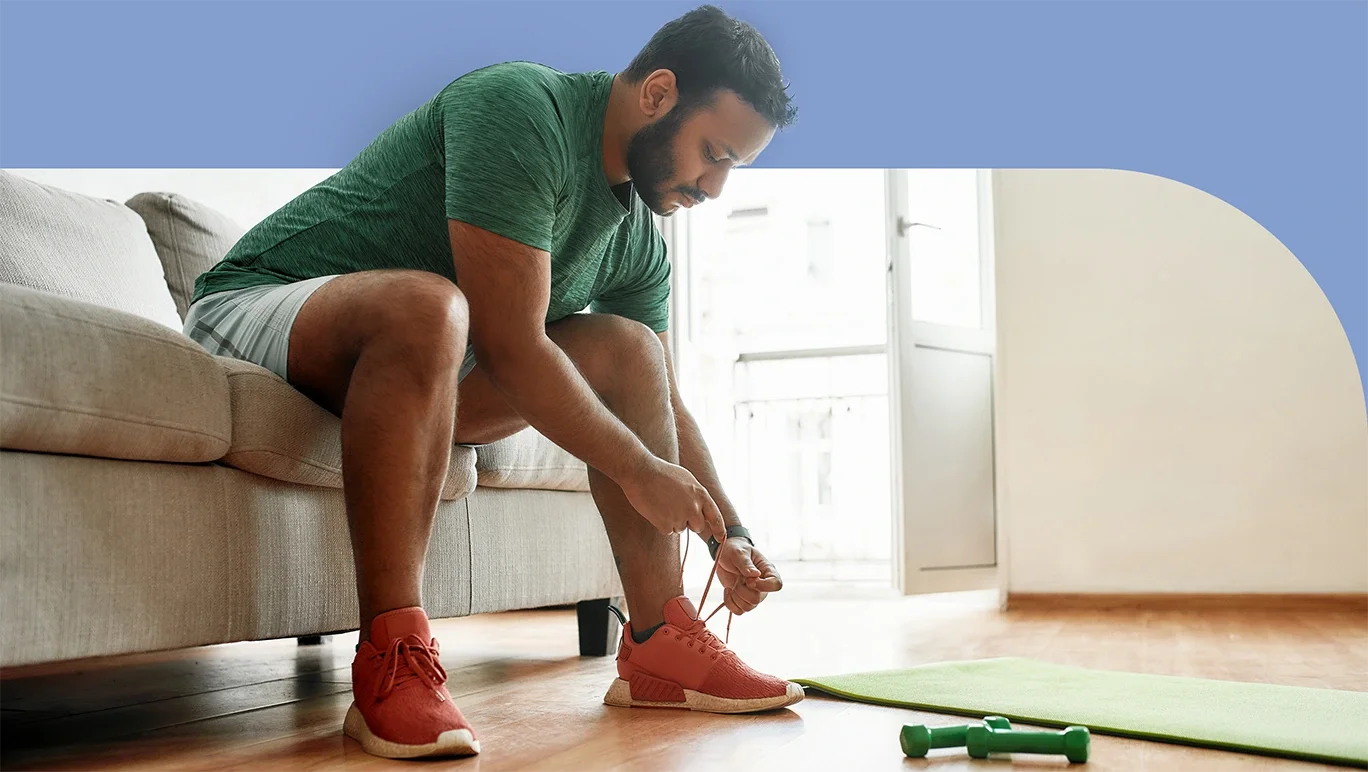How routines can help you achieve your health goals

Having some structure in your life can help you to achieve your health goals. Although we’re all individuals, we’re still human. And humans are creatures of habit.
Let's explore the power of a good routine, and how to set it up. We’ll also look more deeply at:
- some of the best morning routines
- some great night-time routines
- healthy eating and other routines
And we’ll also talk about keeping your routine flexible. After all, we all hit unexpected speed bumps and challenges we need to overcome in our day-to-day lives.
The power of a good routine
GP Dr Jill Gamberg says that, “Routines help us to get more organised and feel less overwhelmed. This results in less procrastination and stress, which is great for our health!”
She suggests starting with identifying your personal circadian rhythm (your body’s 24-hour internal clock). Understanding this will help you to identify when you most like to do certain activities, and this self-knowledge can then help you plan your daily routine.
If you’re a parent you’ll probably want to plan routines for your children as well. According to Dr Jill, routines can help kids to:
- become more resilient
- feel less overtired
- eat better
- grow better
- engage more
But my personality doesn’t suit routines!
If you’re trying to create a healthy routine, do it with a friend or family member.
If you’re not a routine kind of person, that’s fine. “Everyone’s different,” comments Dr Jill. “If you hate routines, there’s no benefit in being rigid. That can drain your creativity and stifle you.”
She says that the key is to know what works for you. If you need to make your routine extra flexible, that’s fine. Or maybe it means not having a routine at all. Either way, it’s OK, as long as you do the things you need to get done.
How to set up your goals
Setting goals
We all – including kids - have goals of some kind, but we often get stuck on achieving them.
“If so, break your goals down into smaller goals,” Dr Jill recommends. For example, running a marathon probably feels overwhelming. But if you break it down into smaller steps, say running for 30 minutes three times a week and gradually increasing from there, that feels more achievable.
It’s about changing your behaviour over time to help make long-term lifestyle changes.
Dr Jill also recommends SMART goals. SMART stands for Specific, Measurable, Attainable, Relevant and Time-based. An example of a smart goal is ‘I will run a marathon by the end of this year’.
Here’s how that goal includes each element of ‘SMART’:
- Specific: what exactly is your goal? In this example, you’re not just generally ‘running more’ or doing more exercise – you’re specifically running a marathon.
- Measurable: can you easily measure whether you’ve achieved the goal or not? In this case, yes: you’ve either completed the marathon or you haven’t.
- Attainable: can you realistically achieve this goal? The answer depends on where you’re starting out - don’t set unattainable goals, but don’t make them too easy either!
- Relevant: is your goal relevant to your life? Does it relate to something you genuinely want? Why do you want to run the marathon? What’s it relevant to in your life?
- Time-based: when do you want to complete the goal by? Setting a deadline – in our example, by the end of the year – gives you more motivation to achieve the goal.
Achieving those goals
Dr Jill says that accountability can be extremely helpful for motivating us to reach our goals. “If you’re trying to create a healthy routine, do it with a friend or family member,” she recommends.
She also suggests picking healthy activities that you enjoy. That marathon goal wouldn’t be a good idea if you know you hate running. This is where knowing why your goal is relevant helps. Perhaps you originally thought of running a marathon to feel fitter. If so, and you love dancing, maybe set a goal of doing a Zumba class three times a week instead.
Morning wellness routines
Waking up on the wrong side of the bed can leave you feeling rushed and rattled, which then affects the rest of your day. To avoid this, a morning routine can help ease you into your day.
Dr Jill offers 5 of her best morning routine suggestions:
- Start the day with a 10-minute walk. Fresh air and walking can be invigorating.
- Draw on the power of music. If you’re not a morning person, try boosting your mood with some upbeat tunes.
- Drink a glass of water first thing. Hydrate before hitting the hard stuff (by which we mean coffee!) Water is essential and can increase mental wellness and performance during the day.
- Keep a gratitude journal. It’s so easy to focus on the negatives, but a gratitude journal reminds us of the good things in our lives.
- Build in extra time. Especially if you’re commuting, leave plenty of time to get to your destination. Rushing causes stress and anxiety, so give yourself plenty of time and allow for delays.
more on healthy habits
Night-time routines
Ending your day right is also important and aids in having a more restful sleep. High-quality sleep also makes your brain sharper for the following day. Here are some suggestions:
- Cut the caffeine. If you work from 9 to 5, everything you do after 4pm affects your sleep. Caffeine stays in your system for an average of around to six hours, so switch to water or herbal teas after 4pm.
- Watch your alcohol intake. Alcohol may make you drowsy, but it also interferes with quality sleep. Either avoid it altogether, or stop drinking at least two hours before bed.
- Eat a light dinner a few hours before bed. Overeating or eating heavy meals at night may lead to discomfort and indigestion.
- Prepare for tomorrow. If you’re a morning walker or exerciser, get your activewear ready for when you wake up.
- Enjoy some ‘me time’. This might be an episode or two of your favourite TV show, playing a video game or reading a book.
However, stop watching TV or using a phone, tablet or computer screen at least 30 minutes before bed. The blue light from screens may affect your sleep.
Daily food routine examples
We tend to eat whatever’s available in our kitchen cupboards. So, if you buy junk food from the supermarket, that’s what you’ll snack on when you’re hungry. But the same applies if there’s healthy food in your house.
Dr Jill says there’s nothing wrong with having chips or chocolate sometimes. But if they’re not there, you won’t reach for them. She also says that preparing a grocery list before you go shopping will help to decrease your impulse buys.
When eating out, Dr Jill recommends mostly choosing restaurants with healthier options. It’s okay to have the odd hamburger - just not every day. However, she also says that creating a routine of cooking at home is usually better, with benefits like:
- eating healthier food
- more appropriate portions sizes
- more opportunity to enjoy family time
Other wellness routines
Some people prefer doing morning exercise routines – perhaps a morning yoga or stretching routine. Others prefer to get the exercise they need in the afternoon or evening. Still others rely on incidental exercise.
Regardless, the important thing is to find what works for you, and change it up if it stops working. Dr Jill comments that in her twenties, she exercised after dinner every night. Now, she thinks that would kill her, so she’s changed her routine to suit her new situation.
You might also consider creating a mindfulness or meditation routine to support your mental wellness.
Feeling stuck?
Routines can be incredibly helpful in achieving our health goals, but many of us struggle to form them on our own. If that’s true for you, Dr Jill recommends reaching out to a professional such as a:
- GP
- psychologist
- dietitian
- exercise physiologist
“Lastly,” Dr Jill says, “Be kind to yourself. None of us are perfect. We all make mistakes. You can’t change yesterday, but you can always change tomorrow.”
Reviewed by the healthylife Advisory Board June 2021


